Did you know that artificial intelligence and machine learning are revolutionizing the way marketing strategies are developed and implemented? In today’s digital age, data-driven insights and predictive analytics play a crucial role in reaching target audiences and driving conversions. The integration of AI and ML technologies in marketing has significantly enhanced personalized customer experiences and improved campaign performance.
In this article, you will learn how the utilization of artificial intelligence and machine learning can transform your marketing efforts. From understanding consumer behavior patterns to optimizing content delivery and automating repetitive tasks, the possibilities are endless. Discover the latest trends and best practices in AI and ML for marketing, and unlock the potential to achieve unprecedented growth and success in your campaigns.
Get ready to explore the cutting-edge tools and techniques that will take your marketing strategies to the next level. Whether you are a seasoned marketer looking to stay ahead of the curve or a budding entrepreneur seeking innovative solutions, harnessing the power of AI and ML in your marketing endeavors is the key to staying competitive in today’s dynamic marketplace. Stay tuned as we delve into the realm of artificial intelligence and machine learning in marketing, and unleash the full potential of these game-changing technologies.
The Power of Artificial Intelligence and Machine Learning in Marketing
In today’s fast-paced digital world, the buzzwords “Artificial Intelligence” and “Machine Learning” have become increasingly prevalent in the realm of marketing. But what exactly are they, and why are they so vital in shaping the future of marketing strategies? Let’s delve into the world of AI and ML and uncover the significant impact they have on the marketing landscape.
Artificial Intelligence, or AI, refers to the simulation of human intelligence processes by machines, particularly computer systems. This advanced technology enables machines to learn from experience, adapt to new information, and perform tasks that typically require human intelligence, such as image recognition, speech recognition, decision-making, and language translation. On the other hand, Machine Learning, a subset of AI, focuses on the development of algorithms and statistical models that allow machines to improve their performance on a specific task without being explicitly programmed.
The integration of AI and ML in marketing has revolutionized the way companies analyze data, interpret consumer behavior, and engage with their target audience. By harnessing the power of AI and ML technologies, marketers can gain valuable insights into customer preferences, predict future trends, personalize marketing campaigns, automate routine tasks, and enhance overall customer experience.
According to a report by Salesforce, 51% of marketing leaders are already using AI in their marketing strategies, with 27% planning to incorporate it within the next two years. Furthermore, Gartner predicts that by 2023, 30% of all B2B companies will employ AI to augment at least one of their primary sales processes.
One notable success story in the realm of AI and ML in marketing is the case of Coca-Cola. The beverage giant leveraged AI technology to create personalized marketing campaigns tailored to individual consumers based on their preferences and purchasing behavior. By analyzing vast amounts of data in real-time, Coca-Cola was able to deliver targeted ads, promotions, and product recommendations, resulting in a significant increase in sales and customer engagement.
In conclusion, the utilization of Artificial Intelligence and Machine Learning in marketing is not just a trend but a fundamental shift in how businesses interact with their customers and drive growth. By embracing these cutting-edge technologies, companies can gain a competitive edge, optimize their marketing efforts, and ultimately achieve greater success in an increasingly digitized world. Stay tuned as we explore the practical applications and benefits of AI and ML in marketing in our upcoming blog posts.

How to Apply Artificial Intelligence and Machine Learning in Marketing Step by Step
Artificial Intelligence (AI) and Machine Learning (ML) have revolutionized the field of marketing, providing innovative tools and techniques to optimize campaigns, personalize customer experiences, and improve overall performance. In this guide, we will walk you through a step-by-step process on how to effectively apply AI and ML in your marketing strategies.
1. Understand Your Data:
The first step in leveraging AI and ML in marketing is to analyze and understand your data. Start by collecting relevant data sources such as customer interactions, website behavior, and sales transactions. Clean and prepare the data to ensure accuracy and consistency before moving forward.
2. Define Your Goals:
Clearly define your marketing objectives and goals that you want to achieve using AI and ML. Whether it’s improving lead generation, increasing conversion rates, or enhancing customer segmentation, having clear goals will guide your AI and ML strategies towards success.
3. Choose the Right Tools and Platforms:
Select the appropriate AI and ML tools and platforms that align with your marketing objectives. Popular choices include customer relationship management (CRM) systems with AI capabilities, predictive analytics tools, and automated marketing platforms. Evaluate different options based on features, pricing, and compatibility with your existing systems.
4. Implement AI-Driven Personalization:
Utilize AI algorithms to create personalized marketing campaigns tailored to individual customer preferences and behaviors. Leverage customer data to segment audiences, predict future trends, and deliver targeted content through email marketing, social media, and website experiences.
5. Measure and Optimize Performance:
Track the performance of your AI and ML-powered marketing initiatives by monitoring key metrics and KPIs. Analyze the results to identify patterns, trends, and areas for improvement. Use A/B testing and performance optimization techniques to continuously refine your strategies for maximum impact.
By following these steps and harnessing the power of Artificial Intelligence and Machine Learning in your marketing efforts, you can unlock new opportunities, drive growth, and stay ahead in today’s competitive landscape. Start implementing AI and ML in your marketing strategies today to see tangible results and transform the way you engage with your audience.
Maximizing Artificial Intelligence and Machine Learning in Marketing:
✅ Tip 1: Utilize AI-powered tools for data analysis to gain insights into customer behavior and preferences.
❌ Avoid relying solely on AI without human input and oversight to ensure accurate decision-making.
💡 Extra tip: Constantly update your AI algorithms to keep up with changing market trends and consumer preferences.
✅ Tip 2: Implement machine learning algorithms to personalize marketing campaigns based on individual customer data.
❌ Avoid generic mass advertising strategies that do not take into account customer segmentation and personalization.
💡 Extra tip: Conduct A/B testing to optimize machine learning models for better campaign performance.
✅ Tip 3: Use AI chatbots to provide instant customer support and enhance user experience on your website or social media platforms.
❌ Avoid using chatbots that are not programmed to handle complex customer queries or issues effectively.
💡 Extra tip: Regularly train your chatbots with new data to improve their conversational abilities and accuracy.
✅ Tip 4: Leverage AI-driven predictive analytics to forecast future trends and make informed marketing decisions.
❌ Avoid basing your marketing strategies solely on historical data without considering current market dynamics.
💡 Extra tip: Collaborate with data scientists to develop customized AI models tailored to your specific marketing needs.
✅ Tip 5: Explore AI-powered content generation tools to produce engaging and relevant marketing materials at scale.
❌ Avoid automated content creation that lacks human creativity and emotional intelligence.
💡 Extra tip: Use AI tools to analyze content performance metrics and refine your marketing strategies accordingly.
✅ Tip 6: Harness AI for real-time personalization of website content and product recommendations to enhance user engagement.
❌ Avoid intrusive personalization tactics that compromise user privacy and trust.
💡 Extra tip: Monitor customer feedback and behavior to fine-tune your AI algorithms for better personalization outcomes.
✅ Tip 7: Incorporate AI into your email marketing campaigns to optimize send times, subject lines, and content for higher open and click-through rates.
❌ Avoid bombarding recipients with irrelevant or excessive marketing emails generated by AI algorithms.
💡 Extra tip: Test different AI-driven email variations to identify the most effective strategies for your target audience.
✅ Tip 8: Invest in AI marketing platforms that offer comprehensive analytics and reporting capabilities to measure the impact of your campaigns.
❌ Avoid investing in AI technologies without a clear understanding of how they align with your overall marketing goals and strategies.
💡 Extra tip: Continuously evaluate the ROI of your AI investments and make adjustments to optimize performance and results.
In conclusion, understanding the role of Artificial Intelligence and Machine Learning in Marketing is crucial for staying ahead in today’s digital landscape. By implementing these technologies effectively, businesses can improve customer experience, optimize advertising efforts, and gain valuable insights for decision-making. It is clear that the future of marketing lies in AI and ML, and embracing these tools will be key to achieving success in the long run.
What strategies will you be implementing first in your marketing efforts? Share your thoughts in the comments below or share this article with someone who could benefit from it. Let’s continue learning and growing together in this exciting field of AI and ML in Marketing.
FAQs about Artificial Intelligence and Machine Learning in Marketing
What is Artificial Intelligence (AI) and Machine Learning (ML) in the context of Marketing? AI and ML refer to technologies that enable computers to analyze data, learn from it, and make decisions or predictions without explicit programming.
How are AI and ML used in Marketing? AI and ML are used in marketing to analyze consumer behavior, personalize content, optimize advertising campaigns, automate customer interactions, and forecast trends.
What are the benefits of using AI and ML in Marketing? Some benefits include improved targeting, increased efficiency, enhanced personalization, better ROI, and the ability to adapt to changing market conditions quickly.
Are there any examples of AI and ML applications in Marketing? Yes, examples include recommendation engines, chatbots, predictive analytics for customer segmentation, automated email marketing, dynamic pricing, and sentiment analysis on social media.
How can businesses implement AI and ML in their Marketing strategies? Businesses can start by collecting data, identifying use cases, selecting the right tools or platforms, testing and optimizing their models, and ensuring compliance with data privacy regulations

